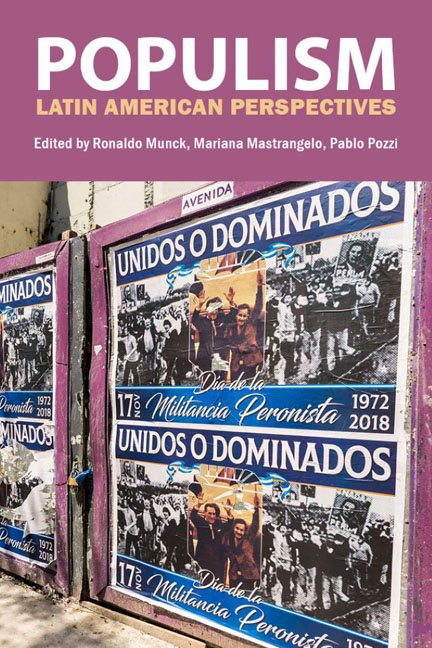Book contents
- Frontmatter
- Contents
- Abbreviations and acronyms
- Foreword
- Introduction
- 1 Populism in Latin America: development, democracy and social transformation
- 2 Peronism in Argentina: left or right?
- 3 The populist left in Chile: socialists and communists from 1936 to 1973
- 4 The left and the Workers’ Party in Brazil: a party between populism, social policies and the popular vote
- 5 Brazil, Bolsonaro and populism of the right
- 6 Political dilemmas of the government of López Obrador: between populism, democracy and the left in Mexico
- 7 The Bolivarian process in Venezuela: socialism, populism or neoliberalism?
- 8 Populist responses to crises of market democracy: the case of Bolivia’s Evo Morales
- 9 Ecuador: populism and the 2007– 17 political cycle
- 10 The Nicaraguan crisis and the mirage of left populism
- 11 Populism and the right in Latin America
- 12 Populism and the left in Latin America
- Afterword: a tale of two “people”: national popular and twenty-first-century Latin American populisms
- Contributors
- Index
4 - The left and the Workers’ Party in Brazil: a party between populism, social policies and the popular vote
Published online by Cambridge University Press: 23 January 2024
- Frontmatter
- Contents
- Abbreviations and acronyms
- Foreword
- Introduction
- 1 Populism in Latin America: development, democracy and social transformation
- 2 Peronism in Argentina: left or right?
- 3 The populist left in Chile: socialists and communists from 1936 to 1973
- 4 The left and the Workers’ Party in Brazil: a party between populism, social policies and the popular vote
- 5 Brazil, Bolsonaro and populism of the right
- 6 Political dilemmas of the government of López Obrador: between populism, democracy and the left in Mexico
- 7 The Bolivarian process in Venezuela: socialism, populism or neoliberalism?
- 8 Populist responses to crises of market democracy: the case of Bolivia’s Evo Morales
- 9 Ecuador: populism and the 2007– 17 political cycle
- 10 The Nicaraguan crisis and the mirage of left populism
- 11 Populism and the right in Latin America
- 12 Populism and the left in Latin America
- Afterword: a tale of two “people”: national popular and twenty-first-century Latin American populisms
- Contributors
- Index
Summary
On the first day of 2007, Luiz Inácio Lula da Silva took office for his second term as president of the republic of Brazil. The event marked an important political moment for left-wing Brazilian and Latin American political forces. As if it was not enough to have won the presidential elections for the first time in 2002, the Workers’ Party – Partido dos Trabalhadores (PT) – now demonstrated that it could lead a government in an environment of relative institutional stability and achieve its continuity by democratic means. Unlike what happened at the first inauguration, when around 150,000 people took over Brasília with many red flags to welcome the new government, the second presidential inauguration was more discrete and less effusive. Once the novelty of four years earlier had passed, the inauguration of a president with Lula's personal and political trajectory no longer generated so much impact.
But it cannot be said that presidential inaugurations of democratically elected presidents in Brazil had become so frequent that they no longer attracted attention. Since the founding of the city of Brasília in 1960, a landmark of Brazilian modernist architecture and an expression of the developmental nationalism that had inspired government policies in the period immediately following World War II, it was only the sixth time that a president, elected by universal suffrage, had begun their mandate. The military dictatorship, imposed after the 1964 coup d’état, interrupted a relatively open and competitive political process that had begun in 1945. However, even in the brief democratic experience that the country had lived until the military took power, the left and popular forces had few opportunities to directly contest the popular vote and present a programme of social change. The Brazilian Communist Party was legalized in 1945, ran for presidential elections and managed to elect a small but symbolic and combative group of congressmen. However, in the context of insertion of the country into the geopolitics of the Cold War, the communists were forced to return to their usual clandestine activity, being outlawed from national political life in 1947.
- Type
- Chapter
- Information
- PopulismLatin American Perspectives, pp. 69 - 84Publisher: Agenda PublishingPrint publication year: 2023



